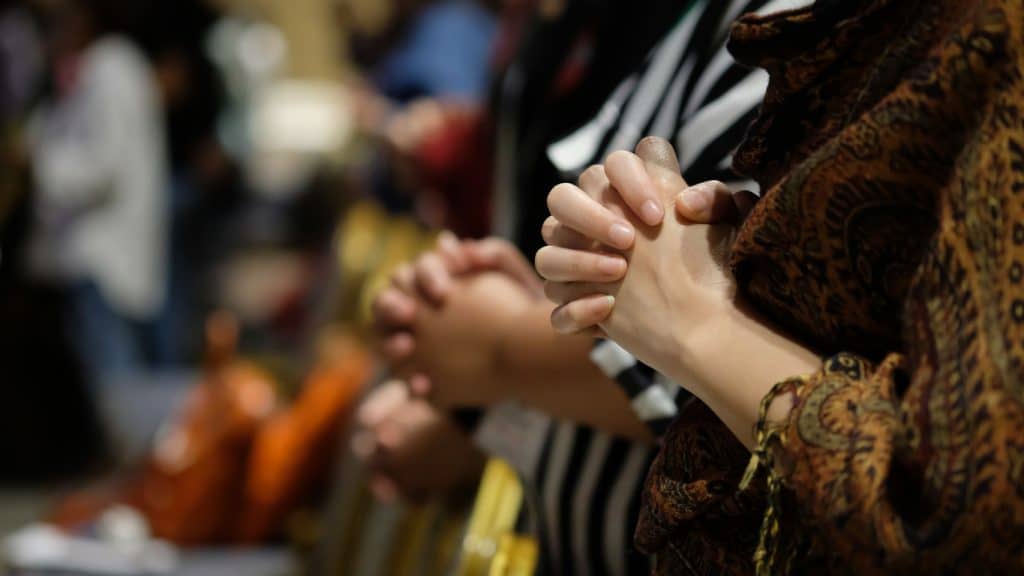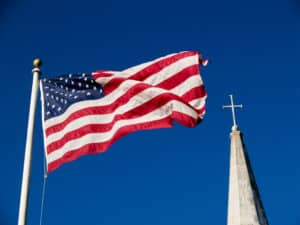
Maya Pilbrow
3 February 2023
Is religion disappearing from public life, or is Christianity influencing politics to a worrying degree?
Was Andrew Thorburn’s resignation as chief executive of the Essendon Football Club due to discrimination, or was the club’s claim that Mr Thorburn’s views were incompatible with their own valid?
Did the Victorian Liberal Party make a mistake in distancing themselves from Renee Heath?
Some Christians may begin to worry about expressing their faith publicly. Conversely, some might think politics is being unduly influenced by fringe religious groups
All these concerns seem to revolve around the role of religion in public life.
Recent events have incited a fresh round of debate over what it means to be a secular democracy.
Pilgrim Theological College Professor of Missiology and Intercultural Theology John Flett said some of these questions represented valid concerns, but that he thought the wider debate over Christianity in public life had been blown out of proportion.
Dr Flett said misconceptions about Christianity were common in mainstream discussions about the role of religion in public life.
He said some Christian organisations, such as David Pellowe’s Church and State Summit were openly political in their aims and that it was worthwhile to be informed about groups that seek political goals.
Dr Flett said legitimate concerns over what he referred to as mainstream dominionism, such as that promoted by Church and State Summit, were obscured by fearmongering over mundane practices within certain denominations, such as practices like speaking in tongues.
He said mainstream media coverage of what he referred to as conservative churches, such as those attended by Andrew Thorburn and Renee Heath’s family, tended to focus on practices such as speaking in tongues, framing them as strange and foreign.
“[For hundreds of million of] Pentecostals and charismatics in the world, speaking in tongues is a completely normative practice, but it looks really odd to people who are completely outside that [culture],” he said.
The discourse surrounding Mr Thorburn’s resignation and Ms Heath’s treatment by her party has died down once again, but experts say questions about the role of religion in public life and how our ever-changing society deals with these issues remain relevant.
Read more: People should be able to hold different views on complex matters: Thorburn
Academic Audrey Statham, whose research focuses on democracy and education, said the role of religion in public life was theologically and philosophically complex, cutting right to the core of what it meant to be a democracy that is genuinely inclusive of diverse groups and individuals, both non-religious and religious.
She said much of the conversation around religion in public life was because the concept of secularism was itself open to interpretation.
Dr Statham said a major school of thought regarding secularism came from American theologian Stanley Hauerwas, who saw secularism as something which forced religious believers to police their own convictions in the public arena.
“It’s a pretty negative view of what a secular society is,” she said. She noted that this perspective was nonetheless quite persuasive among some religious groups.
Dr Statham said another approach saw secularism as the appropriate response to diversity within a democratic state, a point of view credited to Canadian philosopher Charles Taylor.
She said this view emphasised including religious groups of all stripes within public debate.
Ridley College lecturer The Revered Dr Michael Bird agreed with this definition, saying secularism was about creating space for people of all faiths.
“[Secularism] is a tool for maintaining equality while respecting one another’s differences,” he said.
Dr Bird characterised the debate over religion in public life as a series of knee-jerk reactions to pressure from the left and the right.
“There are people who want something theocratic, a kind of a benevolent Christian despot. And there are those who want the same thing with a progressive despot who will deliberately marginalise religion,” he said.
Dr Bird said these points of view were incompatible with true secularism, but that mainstream and social media were responsible for stirring up animosity between religious and non-religious people.
He said Christians ought to defend secularism.
Dr Statham agreed, saying she believed secularism to be valuable.
“We should foster [secularism]. It requires different attitudes towards the role we can play as religious people in a democracy,” she said.
Dr Statham said democracy needed to be understood as an ongoing process, one which strived to include viewpoints that ranged from commonplace to controversial.
She said individuals within democratic states needed to be open to hearing different perspectives from their own in order to live and act fully democratically, and that the democratic process was failing if it excluded religious people or caused them to turn away from public life.
Read more: Religious discrimination train wreck draws mixed response
Lobby groups and Christian advocacy organisations have expressed that they feel they are being excluded from public life.
Australian Christian Lobby politics national director Wendy Francis said recent events in Victoria including the Essendon Football Club controversy and the Victorian Liberals treatment of Renee Heath had contributed to an environment where religious people did not feel comfortable expressing themselves.
“Anybody of faith feels quite alienated in Victoria,” she said.
Ms Francis said people of faith were the Liberal Party’s natural constituency and many religious people felt abandoned by major party politics in the last year.
Dr Flett said astute political actors could galvanise religious anxieties, saying the ACL, which he pointed out was recently declared a hate group by the Global Project Against Hate and Extremism, was an example of this.
Dr Flett said Christians had diverse views on many issues, and it was an error to assume Christians were right-wing.
“Penny Wong is a Uniting Church member, and you don’t get more left than Penny Wong,” he said.
Dr Flett said unfamiliarity with the realities of modern Christianity often resulted in scaremongering within public debate over secularism.
“There is profound ignorance to the point of fear,” he said.
But Dr Flett also said fear and paranoia were common among some Christians who felt they were undergoing persecution for their beliefs.
He acknowledged this paranoia was real but noted that many of these fears played into political culture wars over issues of gender, sexuality and morality.
Read more: Calls to train clergy to repair faith-based conversion harms
After losing pre-selection to Renee Heath, whose family has long-standing ties with controversial City Builders Church, former MP Catherine Burnett-Wake said in her valedictory statement to Parliament that she was concerned about the rise of “factions who now believe the time has come for their racist, nationalist, LGBTIQ-hating, pro-conversion and anti-women’s rights agendas to come to the fore” within Victorian politics.
Former members of the church have alleged they were subject to conversion therapy.
Ms Heath, whose parents are pastors in the controversial church, has said she should not be judged by the statements and actions of her family.
Dr Flett said it was vital to listen to and engage with religious groups, especially those deemed to be controversial or fringe, to address the issues face by those within those groups and avoid exclusion which might lead to alienation.
“It becomes a question of how do you actually make sure that everyone has a voice within society, and that their ideas are exposed, not in the sense of repudiated, but actually so they can become part of discourse,” he said.
For more faith news, follow The Melbourne Anglican on Facebook, Twitter, or subscribe to our weekly emails.







